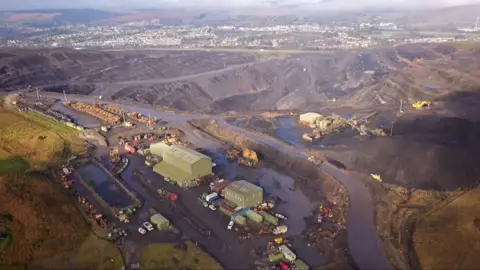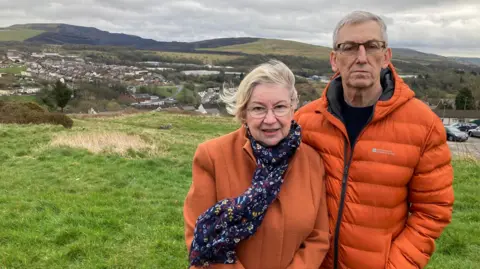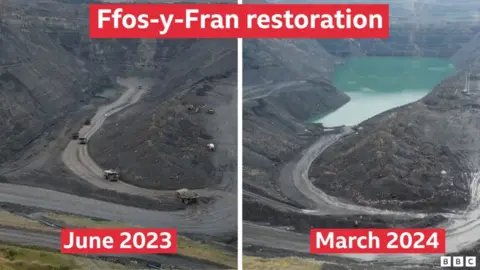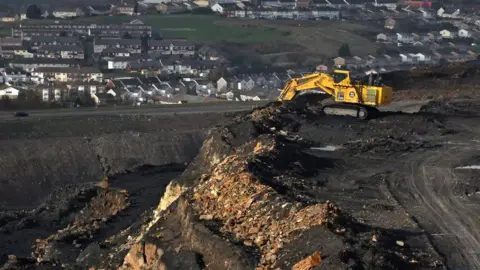 BBC
BBCOversight of what was the UK’s largest opencast coalmine has been described as a case of “epic mismanagement” with “heart-rending” impacts for people affected.
A Senedd committee warned of a “permanent scar” above Merthyr Tydfil if the vast Ffos-y-Fran site was not fully restored.
Its report includes stinging criticism of the mine’s operator and said the Welsh government and other authorities failed to act on previous warnings over the site’s future.
The Welsh government said it would consider the committee’s recommendations.
Mining firm Merthyr (South Wales) Limited said it had recently held a “constructive” meeting with all relevant public authorities, with another planned for late September.
It said it continued to make progress on developing a revised restoration proposal for the site.
The Ffos-y-Fran saga was the latest in a long list of “broken promises” on restoration of opencast mines in Wales, according to the Senedd’s Climate Change, Environment and Infrastructure Committee.
“Hearing from residents about the impact these sites have had… has been the most heart-rending aspect of our inquiry,” it said in a report.
“People’s lives, health, well-being, and homes have been severely affected over many years, if not decades.”
Ffos-y-Fran, which closed in November 2023, was a “symbol of the system’s failures”, it added.
The mine’s operator had sparked anger – and legal action from campaigners – after continuing to dig and sell coal for well over a year beyond the deadline on its planning permission.
It is now working on a different – and far cheaper – restoration plan for the site after warning of “insufficient funds” available to deliver on the original agreement.

Alyson and Chris Austin live near the surface mine, which is the size of some 400 football pitches, and gave evidence to the committee’s inquiry.
“We have huge concerns about what the future holds for Ffos-y-Fran,” they said.
“The mining company should be keeping to its promise of a full restoration and the council shouldn’t let them get away with leaving us with dangerous and derelict land.”
The couple said they felt they had been “hung out to dry by our local authority, the Welsh government, and government agencies at all levels”.

A full clean-up of the site could cost up to £120m, based on pushing three, mountainous spoil tips back into the open pit, returning the area to green hillside for the community.
But the committee heard the approach now being considered was to leave a “water body” within the mining void.
Residents have described the proposal as a potentially “dangerous” and “contaminated” lake.
The mining firm wants to use £15m held in a bank account, jointly held by the council, and set up to ensure some of the company’s cash was protected for restoration.
“Like so many others, (the company) has taken profits from the site but now the money they promised for restoration is not there,” the committee said.
Its inquiry heard the firm had paid nearly £50m in dividends and royalties out of the business since 2017.
The report said the local authority now had “little choice other than to accept what the site operator is prepared to offer”.
It said the “unacceptable outcome” followed a pattern seen at other opencast sites, where councils were “held over a barrel”, facing huge costs if companies ultimately decided to walk away.

However its criticism also extended to Merthyr Tydfil council, the Welsh government and other agencies involved in overseeing the mine during the best part of 20 years.
A report commissioned by the Welsh government in 2014 had set out “significant and clear warnings about the potential issues at Ffos-y-Fran” due to “insufficient bond cover”, the committee said.
While “best practice guidance” from the UK Coal Authority in 2016 called for the restoration liability at opencast sites to be reassessed annually.
“We must question whether the local authority and the Welsh government have taken all necessary steps to seek a better outcome for the local community,” the committee said.
It called for tougher enforcement action when planning rules were breached, and more involvement from residents in decisions around mining sites – including a requirement for a degree of community ownership of any future schemes.
While it is unlikely brand new opencast mines would be approved in Wales, due to climate change laws, the committee warned work to remediate old coal tips could lead to similar problems, especially where companies might look to extract and sell coal to fund efforts to make the sites safe.
The committee’s chairman, Llyr Gruffydd MS said residents living near opencast mines too often felt “completely failed by the public authorities who are meant to protect them”.
At Ffos-y-Fran, time was “quickly running out to secure what was promised for the local community”, he said, calling on all involved to “learn the lessons from this report, so these mistakes are never repeated”.
 Getty
GettyIn a statement issued to the committee’s inquiry, Merthyr (South Wales) Limited said it had reached a formal agreement with the council “to commence an interim restoration programme of works” at the site.
This could see a further 54 hectares (133 acres) of land west of the mining void repaired.
The company said it had “engaged the services of several external consultants, specialists in their field” to prepare a revised restoration plan for the mine and it would be “inappropriate to comment further” until this was finalised and submitted to Merthyr Tydfil council for consideration.
A spokeswoman for the Welsh government thanked the committee for their work on the issue “over the past several months”.
“We will consider the report’s findings and recommendations and respond in due course,” she said.
Merthyr Tydfil council said it noted the recommendations the report made.
It also said it was “pleasing” to note the committee thanked the council for “responding positively and constructively” to the inquiry.

